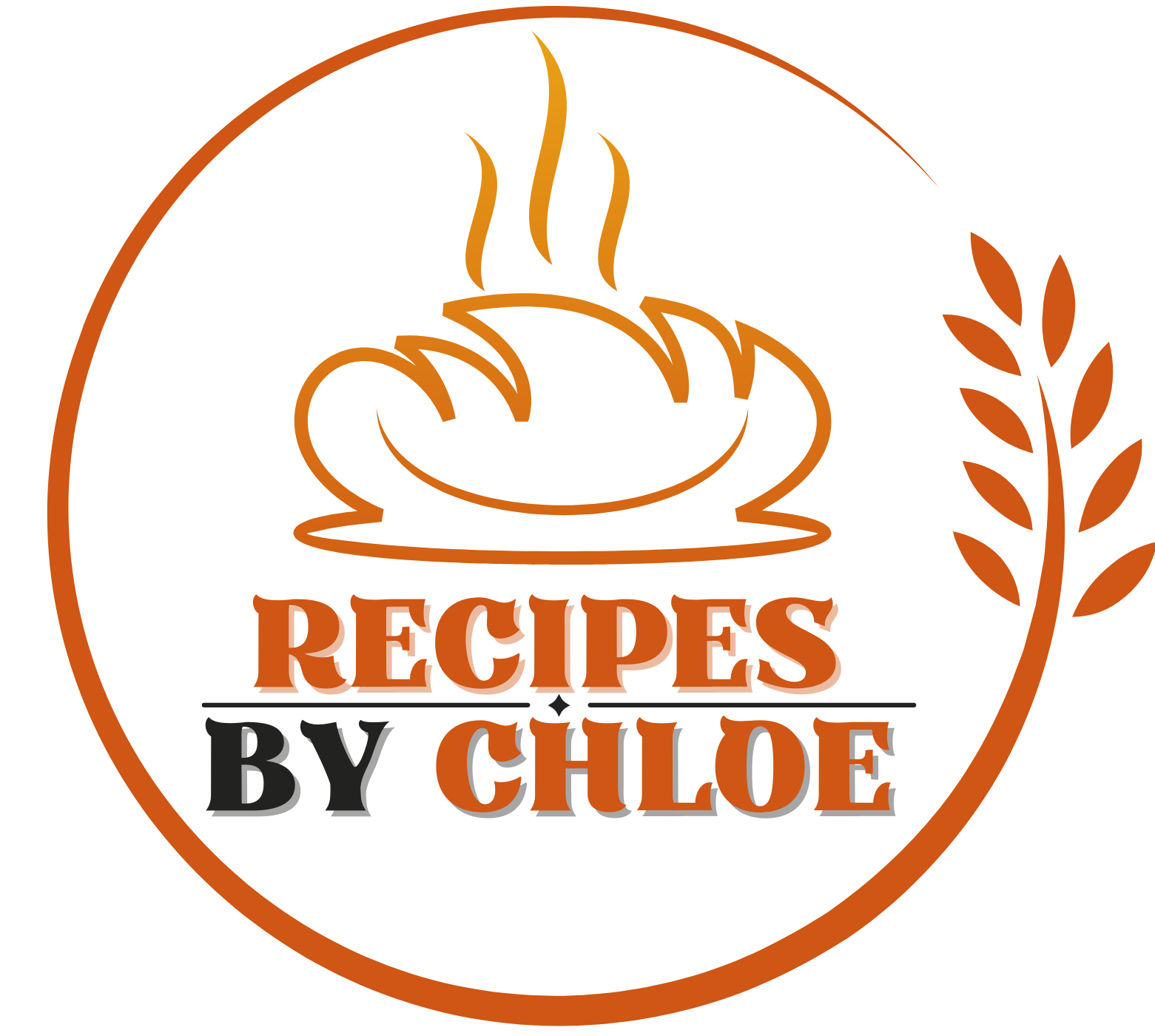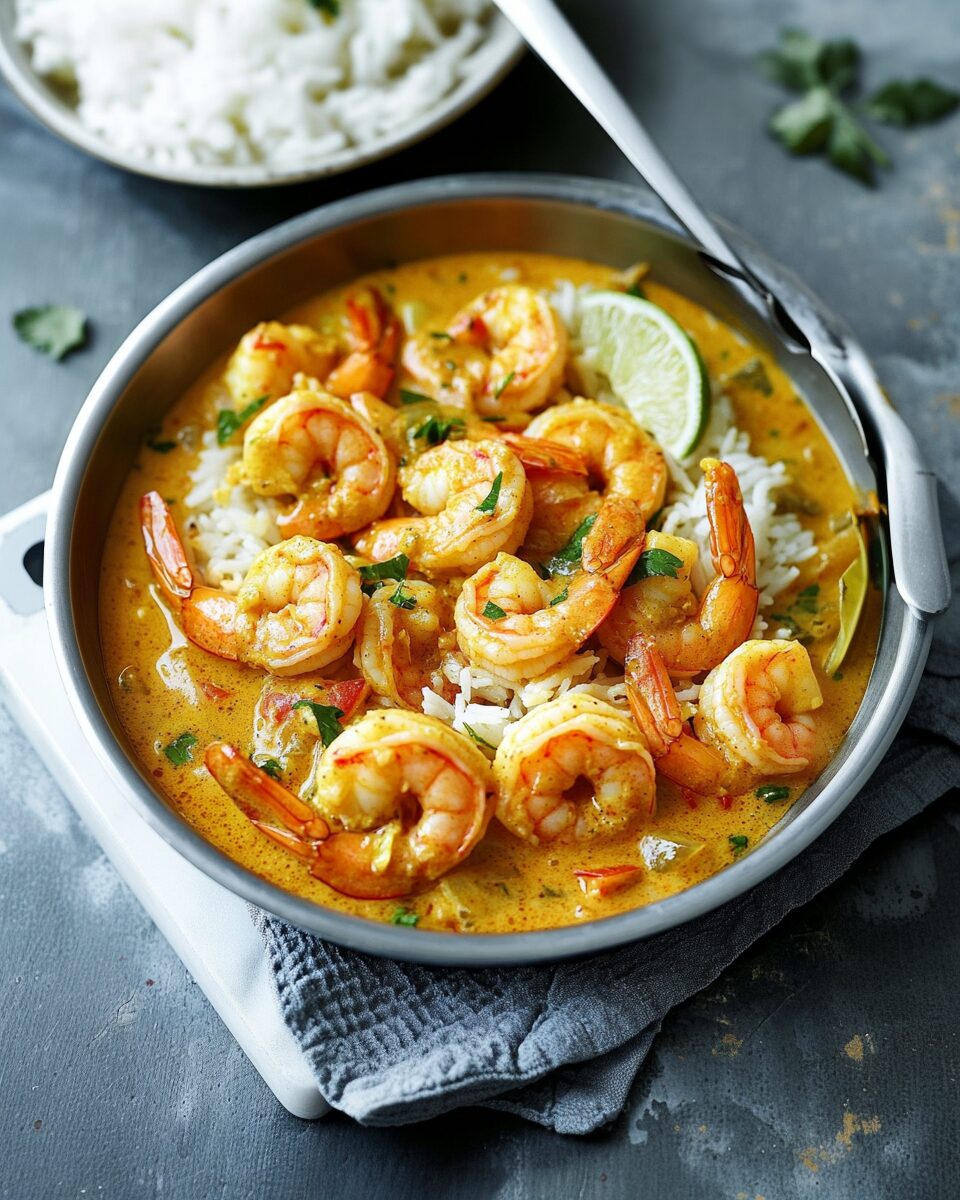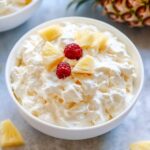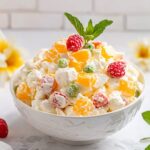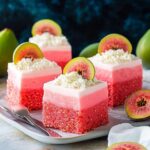Jamaican Curry Shrimp is a flavorful and quick-to-prepare dish that combines succulent shrimp with a rich, spiced curry sauce. Infused with aromatic herbs and the creamy richness of coconut milk, this dish brings the vibrant tastes of Jamaica to your table. It’s perfect for a weeknight dinner or a special occasion, offering a delightful blend of heat and savory depth.
Full Recipe:
Ingredients
- 1 lb large shrimp, peeled and deveined
- 2.5 tablespoons Jamaican curry powder, divided
- 1 teaspoon all-purpose seasoning
- 2 tablespoons olive oil
- 1 medium yellow onion, sliced
- 1 medium red bell pepper, sliced
- 1 medium green bell pepper, sliced
- 1 scotch bonnet pepper, seeds removed and sliced (optional)
- 3 cloves garlic, chopped
- 13.5 oz can unsweetened coconut milk
- ½ tablespoon ketchup
- 4 sprigs thyme or ½ teaspoon dried thyme
- Salt and pepper to taste
Directions
-
In a bowl, season the shrimp with 1 tablespoon of curry powder and all-purpose seasoning. Set aside for about 10 minutes.
-
Heat olive oil in a large skillet over medium heat. Add the sliced onion, red bell pepper, green bell pepper, scotch bonnet pepper (if using), and chopped garlic. Sauté for approximately 5 minutes until the peppers soften slightly.
-
Sprinkle the remaining 1.5 tablespoons of curry powder into the skillet and stir for an additional minute to release its aroma.
-
Pour in the coconut milk, then add the seasoned shrimp, ketchup, and thyme. Ensure the shrimp are well-coated in the sauce.
-
Allow the mixture to simmer over medium heat, stirring occasionally. Cook the shrimp for about 5–6 minutes, flipping them halfway through, until they are fully cooked and opaque.
-
Season the dish with salt and pepper to taste. Serve hot over steamed rice or with your preferred side.
Nutritional Facts
Per serving (based on 4 servings):
- Calories: Approximately 319 kcal
- Carbohydrates: 14 g
- Protein: 3 g
- Fat: 30 g
- Saturated Fat: 21 g
- Sodium: 617 mg
- Potassium: 451 mg
- Fiber: 4 g
- Sugar: 7 g
- Vitamin A: 1144 IU
- Vitamin C: 73 mg
- Calcium: 56 mg
- Iron: 3 mg
Historical and Cultural Significance
The origins of Jamaican Curry Shrimp are deeply rooted in the island’s complex history of colonization and migration. Jamaican cuisine is a tapestry woven from the culinary traditions of the Indigenous Taino people, African slaves, and indentured laborers from India and China. The introduction of curry to Jamaica is attributed to Indian immigrants who arrived in the 19th century. They brought with them a variety of spices and cooking techniques, including the use of curry powder—a blend typically comprising turmeric, coriander, cumin, and other spices. Over time, these Indian culinary practices merged with local ingredients and African cooking methods, giving rise to uniquely Jamaican dishes such as curry goat, curry chicken, and, notably, curry shrimp.
In Jamaican culture, curry dishes hold a special place and are often prepared for communal gatherings, celebrations, and family meals. The adaptability of curry allows it to be paired with various proteins and vegetables, reflecting the island’s resourcefulness and creativity in the kitchen. Curry shrimp, in particular, is cherished for its quick preparation time and its ability to deliver complex flavors with minimal ingredients.
Flavor Profile and Ingredients
The allure of Jamaican Curry Shrimp lies in its intricate balance of flavors and textures. The dish is characterized by the following key components:
-
Curry Powder: The cornerstone of the dish, Jamaican curry powder differs from its Indian counterpart by incorporating local spices such as allspice (pimento) and a higher proportion of turmeric, which imparts a distinctive golden hue. This blend offers a warm, earthy flavor with subtle sweetness and a hint of heat.
-
Coconut Milk: This ingredient adds a creamy richness that tempers the spices and provides a velvety texture to the sauce. The natural sweetness of coconut milk complements the heat from the peppers and the robustness of the curry powder.
-
Scotch Bonnet Pepper: Known for its intense heat and fruity undertones, this pepper is a staple in Jamaican cooking. It infuses the dish with a fiery kick that can be adjusted to suit individual spice preferences.
-
Aromatics: Onions, garlic, and thyme form the aromatic base, contributing depth and complexity to the sauce. Fresh thyme, in particular, is emblematic of Caribbean cuisine and imparts a subtle, herbaceous note.
-
Bell Peppers: These add a slight sweetness and a pop of color, enhancing both the visual appeal and the flavor profile of the dish.
-
Shrimp: The star of the dish, shrimp provides a tender and juicy protein that absorbs the rich flavors of the curry sauce.
Preparation Techniques
The preparation of Jamaican Curry Shrimp involves several key techniques that ensure the development of its signature flavors:
-
Marinating the Shrimp: Seasoning the shrimp with a portion of the curry powder and other spices allows the flavors to penetrate the protein, resulting in a more flavorful dish.
-
“Burning” the Curry: A traditional Jamaican method, this involves sautéing the curry powder in oil before adding other ingredients. This process intensifies the spices’ flavors and eliminates any raw taste, creating a robust foundation for the sauce.
-
Simmering: Cooking the shrimp gently in the coconut curry sauce ensures they remain tender while allowing the flavors to meld and the sauce to thicken to the desired consistency.
Nutritional Considerations
Jamaican Curry Shrimp is not only a feast for the senses but also offers several nutritional benefits:
-
Protein: Shrimp is a high-quality protein source, essential for muscle repair and growth.
-
Healthy Fats: Coconut milk provides medium-chain triglycerides (MCTs), which are metabolized differently than other fats and can serve as a quick energy source.
-
Vitamins and Minerals: The inclusion of vegetables and spices contributes various micronutrients. For instance, bell peppers are rich in vitamin C, while turmeric contains curcumin, known for its anti-inflammatory properties.
However, it’s important to be mindful of portion sizes and the overall balance of the meal, especially for individuals monitoring their intake of saturated fats or sodium.
Serving Suggestions
Traditionally, Jamaican Curry Shrimp is served with accompaniments that complement its rich and spicy flavors:
-
Rice and Peas: A classic side dish in Jamaican cuisine, this combination of rice and kidney beans cooked in coconut milk provides a creamy and slightly sweet counterpoint to the spicy curry.
-
Steamed White Rice: A neutral base that absorbs the flavorful curry sauce, allowing the dish’s spices to shine.
-
Fried Plantains: Their caramelized sweetness offers a delightful contrast to the savory and spicy elements of the curry.
-
Roti or Hard Dough Bread: These can be used to scoop up the curry, adding a satisfying textural component to the meal.
Variations and Adaptations
The versatility of Jamaican Curry Shrimp allows for numerous adaptations to suit different tastes and dietary preferences:
-
Vegetable Additions: Incorporating vegetables such as spinach, okra, or tomatoes can enhance the nutritional profile and add variety to the dish.
-
Protein Substitutions: For those who prefer alternatives to shrimp, proteins like chicken, tofu, or even hearty vegetables like cauliflower can be used while retaining the essence of the curry.
-
Adjusting Spice Levels: The heat can be tailored by varying the amount of Scotch
Conclusion
Jamaican Curry Shrimp is more than just a meal—it is a celebration of cultural fusion, culinary heritage, and bold Caribbean flavor. Its roots stretch across continents, merging Indian spices, African techniques, and Jamaican local ingredients into a dish that’s both comforting and exciting. It stands as a testament to the island’s rich history and its people’s creativity in turning humble ingredients into unforgettable culinary experiences. Whether enjoyed at a family gathering or a casual dinner, this dish evokes warmth, tradition, and togetherness.
